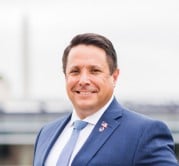Mentor outside your race

Earlier this month, I was invited to join a panel of Hispanic credit union professionals to celebrate Hispanic Heritage Month. It was an honor to join these other accomplished individuals and discuss our professional journeys and the obstacles we each overcame while pursuing our careers. I found the questions illuminating, as they highlighted the role of language, culture, and community in advancing to the next level. Yet, there was one question that stood out for me, the question on the importance of mentors and providing mentorship. Mentoring and mentorship were important parts of my 25-year career in the United States Air Force.
There is no way I could have advanced and been promoted to the rank of full Colonel without a string of mentors guiding me. This is particularly true since I was not raised in a military family and was the first in my family to earn an officer’s commission. Moreover, given the small number of Hispanic officers, particularly at the flag and general officer rank, access to mentors should have been seemingly impossible. Yet, I enjoyed and benefitted from a steady stream of mentors who established and maintained a military tradition that serves our nation well—ensuring that mentorship happens outside of one’s race, gender, and cultural background.
I learned a great deal from each of my many mentors. In fact, I mentioned a few of them during my discussion on The CUInsight Experience Podcast last February. Yet, very few of my mentors were Hispanic, meaning I learned to appreciate different perspectives, multiple approaches to problem solving, and even how to apply lessons learned in addition to being exposed to a variety of cultural experiences.
In terms of giving back, we were instructed to mentor subordinates outside of our race, gender and culture. This principle was reinforced in all professional military education starting at the company grade level and culminating at the war colleges—from which our nation’s senior officers are selected. Why? Because the military in general must share a common bond backed by a strong sense of duty, honor and service that is forged during basic training. Given the mission, individuality RANKS BELOW team cohesion, getting the job done, taking care of one another, and winning our nation’s wars.
I am very proud of those whom I mentored throughout my career, many who are now outpacing my own success. I guarantee the vast majority of these individuals are different from my culture and background. Plus, if you have ever heard me describe the “grocery store” approach to mentorship, a framework for this kind of mentorship can be established. I see the same opportunity for mentorship throughout our credit union system.
Just like our military, our member-owners, staff, and executives represent all walks of life from our great nation—this is very powerful. Just like our military, we have an essential mission to fulfill. And just like our military, we must focus on what unites us in order to overcome the many challenges we see in our streets, markets and politics.
So, what can you do? It is simple—focus on being a mentor outside your own background, especially those that are underrepresented in our industry. Keep an open door, listen to all points of view, and be patient.
Once again, I hope you found something you needed from my Leadership Store. “Take what you need and leave the rest on the shelf”—but always share what you have learned.





